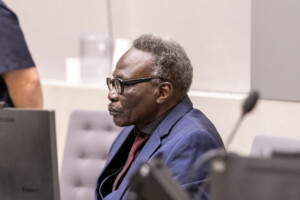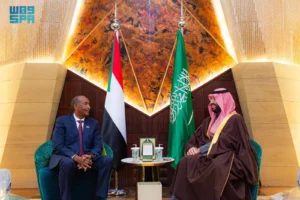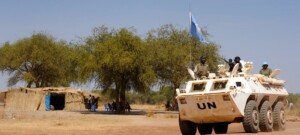UNITAMS head to arrive in Sudan next week
The head of the UN Integrated Transition Assistance Mission in Sudan (UNITAMS) will arrive in Khartoum next week. UNITAMS main office will be based in Khartoum with regional offices throughout Sudan.
 The press conference on the UNITAMS visit in Khartoum (SUNA)
The press conference on the UNITAMS visit in Khartoum (SUNA)
The head of the UN Integrated Transition Assistance Mission in Sudan (UNITAMS) will arrive in Khartoum next week. UNITAMS main office will be based in Khartoum with regional offices throughout Sudan.
The Chairman of the National Committee for Cooperation and Coordination with UNITAMS, Mustafa Abu Ali, said in a press statement yesterday that Prof Volker Perthes, representative of the United Nations Secretary-General and head of UNITAMS, will arrive to take-up office next week.
Abu Ali explained that 12 foreign staff and four Sudanese will form the UN presence on the ground for UNITAMS start-up. He also mentioned there will be a total of 269 staff in total, including experienced national staff in all offices.
The UNITAMS main office will be based in Khartoum with regional offices in Darfur (El Fasher, Zalingei, Nyala), South Kordofan (Kadugli, Kauda), Blue Nile state, (Ed Damazin), and eastern Sudan (Kassala, Port Sudan).
The Ambassador mentioned that the establishment of UNITAMS represents “an acknowledgement that Sudan has come out from a difficult period and is transitioning to democracy.”
The four main tasks of the mission, as mentioned in UN Security Council Resolution 2524, are to assist the political transition, progress towards democratic governance, in the protection and promotion of human rights, and sustainable peace; to support peace processes and implementation of future peace agreements; to assist peacebuilding, civilian protection, and rule of law, in particular in Darfur and the Two Areas; to support the mobilisation of economic and development assistance and coordination of humanitarian assistance.

The UN has allocated $34 million for the first year’s budget.
On June 3 last year, the UN Security Council (UNSC) decided on the establishment of UNITAMS in response to an official request by the Sudanese government to provide a Chapter VI peace support operation to Sudan. The request was sent to the UN Secretary-General on February 27,
At the time, Sudan’s Prime Minister Abdallah Hamdok explained that his government “requested assistance in the form of a mission that helps us to address transition issues, chief among which is financing the implementation of the peace agreements that are imminent, such as the establishment of schools and hospitals… Something similar to the Marshall Plan”.
The UNITAMS mission was partly called into life to replace the joint United Nations-African Union Mission in Darfur (UNAMID), however the mission points out that while UNAMID was a peacekeeping mission under Ch. VII of the UN Charter, with military and police components, UNITAMS is a Special Political Mission (SPM) under Ch. VI, mandated to support the transitional government of Sudan in its transition to democracy.
It was formed by request of the Khartoum government. PM Hamdok requested the UN “to seek a Security Council mandate to establish, as soon as possible, a Chapter VI peace support operation in the form of a special political mission with a strong peacebuilding component.”
Physical protection
A group of 98 Sudanese civil society activists, however, urged the PM in May last year to add ‘physical protection’ to his request for a new UN mission. The activists doubted if Sudan is able to protect its citizens 1.5 years after the ousting of former dictator Omar Al Bashir.
This doubt was reflected by Amnesty International in December when they urged the UN Security Council to extend the mandate of UNAMID by at least six months, “in light of failure by government security forces to protect civilians in recent months”.
However, the mission’s mandate officially ended on December 31 and its gradual withdrawal has started.
In Darfur, the exit of UNAMID stirred up many protests as many fear as well that, with the mission leaving, the insecurity will increase again.
January has seen widespread violence in Darfur, most significantly the massacre in El Geneina that left 163 dead, confirming people’s fears.
* This article was updated on January 28 to reflect clarification of the composition, mission, and nature of UNTAMS provided by the Mission’s Public Information Officer.
Radio Dabanga’s editorial independence means that we can continue to provide factual updates about political developments to Sudanese and international actors, educate people about how to avoid outbreaks of infectious diseases, and provide a window to the world for those in all corners of Sudan. Support Radio Dabanga for as little as €2.50, the equivalent of a cup of coffee.












 and then
and then